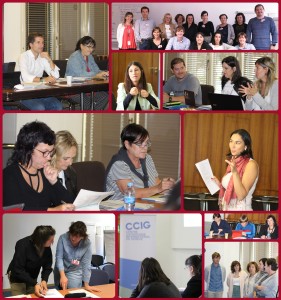
True to its sustained collaborative efforts, the International Catholic Center of Geneva (CCIG) and UNESCO Etxea- UNESCO Basque Country Centre conducted recently a Training Session on United Human Rights Mechanisms from September 24-27, 2019.
The participants for the said capacity building activity were twelve educators from the Basque Country. They were selected among formal education settings that have proved to be most successful in the Basque Country in implementing innovative education practices for social transformation (e.g. incorporating the Agenda 2030 in regular curricula, initiating solidarity projects in the schools, etc.)
Having already a very good expertise in education at the local level, the principal aim was to learn more about international standards and practices on Human Rights Education and Child Participation, in order to strengthen human rights education in their respective schools. Consequently, another objective was to familiarize the participants with the United Nations (UN) Human Rights Mechanisms – such as the UN Human Rights Council, the Universal Periodic Review (UPR), and the Special Procedures – and provide practical resources and key contacts to help the promotion and protection of children’s and youth rights in the Spanish Basque region.
The pool of resource speakers were made up of Ms. Maria D’Onofrio from the CCIG, Ms. Elena Ippoliti of the OHCHR, Ms. Maria Lucia Uribe of Arigatou International and Ms. Elisa Gazzotti of NGO Working Group on Human Rights Education and Training. An important highlight of the training was the timely presentation of the Human Rights Council Resolution 42/7 (A/HRC/RES/42/7) which makes the youth the focus group of the Action Plan for the fourth phase of the World Programme for Human Rights Education.
Attendees of the CCIG-UNESCO Etxea training learned how to collaboratively engage with UN mechanisms and also benefited from the presentations of other speakers representing civil society organizations that are actively involved in the field of human rights education. In addition, the training sessions engaged participants in a constructive and dynamic conversation and reflection on how to enhance and develop further good practices in the area of human rights education in their respective school institutions.
 Their training was complemented by their attendance at some sessions of the 42nd UN Human Rights Council and in a Side Event on “Promoting a Safe and Empowering Environment for All Children and Youth: Best practices for Child and Youth Protection and Participation through Human Rights Education.”
Their training was complemented by their attendance at some sessions of the 42nd UN Human Rights Council and in a Side Event on “Promoting a Safe and Empowering Environment for All Children and Youth: Best practices for Child and Youth Protection and Participation through Human Rights Education.”
The participants have expressed the desire to deepen more their knowledge regarding the UN Human Rights system and demonstrated a growing sense of commitment to search for concrete ways to share their new learnings on human rights education and integrate them into their current pedagogical programs.